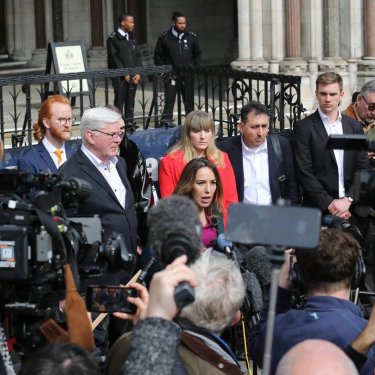Assange extradition: “Day X” ruling represents final hope for justice in the UK courts

The UK High Court’s decision to provisionally allow Julian Assange to appeal his extradition on three grounds represents the final chance for the UK courts to halt his transfer to the US, where he faces life in prison for publishing information in the public interest. Reporters Without Borders (RSF) urges the UK to act to protect journalism by preventing the WikiLeaks founder’s extradition and allowing for his immediate release from prison.
In a written decision on 26 March, Dame Victoria Sharp and Mr Justice Johnson said Assange had a “real prospect of success” on three of the nine grounds on which he was seeking to appeal - relating to his potential exposure in the US to the death penalty and the lack of First Amendment protections he would have as an Australian - and would therefore not be extradited immediately. His appeal may not go ahead, however, if the US government provides “satisfactory assurances” that address those three grounds.
“After four years of court proceedings in the US government’s extradition case against Julian Assange, today’s High Court decision to allow him to appeal on three grounds represents a final hope for justice within the UK. It is worrying, however, that for the second time in these extradition proceedings the UK courts are dependent on US assurances rather than legal arguments, again underscoring the political nature of the case.
“Meanwhile, Assange remains detained at high security Belmarsh prison, where his mental and physical health remain at great risk. Not only his fate, but the future of journalism hangs in the balance with the dangerous precedent that would be set by his extradition and prosecution as the first publisher tried under the Espionage Act. No one should face the possibility of life in prison for publishing information in the public interest. At this late stage, the UK must act to protect press freedom by preventing Assange’s extradition and allowing for his immediate release from prison.”
Rebecca Vincent, RSF’s Director of Campaigns
The US has until 16 April to provide assurances. If it does, there will be a hearing on 20 May to decide if the assurances are satisfactory. If no assurances are provided, or if the judges determine that the assurances are not satisfactory, a full hearing will be convened at a later date to consider the merits of the arguments as presented by Assange’s defence lawyers in the February “Day X” hearing.
Long and tumultuous
Having given less than 24 hours’ notice that a judgment would be handed down, the court refused leave to appeal on a further six grounds, rejecting arguments by Assange’s lawyers that he should be allowed to appeal because he is being prosecuted on account of his political opinions, that he would not have the right to a fair trial, or that new evidence of US plots to kidnap him for the Ecuadorian embassy were relevant to the extradition proceedings.
The UK courts’ consideration of the US government’s extradition case has been long and tumultuous, opening in February 2020 and initially yielding a first instance decision in Assange’s favour in January 2021, when District Judge Vanessa Baraitser ruled against extradition on mental health grounds. This decision was overturned in December 2021 when the US won its appeal following the issuance of diplomatic assurances about Assange’s possible treatment in prison. The Supreme Court refused permission to appeal in March 2022. Former UK Home Secretary Priti Patel then signed the extradition order in June 2022, and Assange’s initial appeal against the order was rejected in a short written decision in June 2023, leading to this final application to appeal.
If extradited to the US, Assange faces up to 175 years in prison on 18 counts related to WikiLeaks’ publication in 2010 of more than 250,000 leaked classified military and diplomatic documents revealing stories in the public interest, including war crimes and human rights abuses that have never been prosecuted. Assange would be the first publisher extradited under the Espionage Act - which lacks a public interest defence - setting a dangerous precedent that could be applied to any journalist or media organisation anywhere in the world. The leaker of these materials, former Army intelligence analyst Chelsea Manning, served nearly seven years in prison before President Obama commuted her sentence, stating it was disproportionate.
Despite a series of evolving barriers to observation, RSF has been the only NGO to monitor all four years of extradition proceedings against Assange in London courts. RSF representatives also gained rare access to visit Assange in Belmarsh prison, and to date have been able to visit him five times since August 2023, after initially being barred access. In parallel to the extradition proceedings in the UK, RSF has also advocated directly with the US government and continues to urge the Biden administration to find a political solution to the case to prevent Assange’s extradition and allow for his release from prison without further delay.
The UK is ranked 26th and the US is ranked 45th out of 180 countries in RSF’s 2023 World Press Freedom Index.
